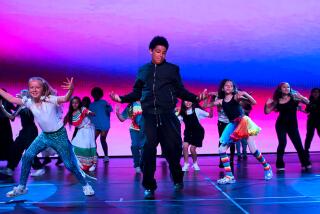The West African Dances of Life : Workshop: With a little abandon, any skill or fitness level can enjoy the OCC class, which the teacher says celebrates human experience from birth to death.
- Share via
COSTA MESA — “If one really wants to learn about the African culture, the best means is through the dance,” says Peter Abilogu, who is leading a two-week workshop at Orange Coast College (through Jan. 14) on West African dance. “The dance is the life of the people.”
Local dancers of any skill level--even people who have never danced and those who missed the first week--may take part in the Monday-through-Thursday workshop. Abilogu teaches excerpts of traditional dances from Nigeria, where he was born, and Ghana, where he was raised. He’ll also espouse the idea that dance permeates every aspect of African life, ergo vividly reflecting the culture.
A 43-year-old Los Angeles resident, he received dance degrees from the University of Ghana (undergraduate) and UCLA (graduate). In the mid-1980s he was director of performing arts at the National Arts Theatre in Lagos, Nigeria’s capital, where he choreographed and performed Nigerian dances. He currently teaches at Loyola Marymount University and El Camino College.
Wearing a bright blue, stripped caftan and matching leggings and gesturing percussively, Abilogu told students earlier this week that “from the African perspective,” dance begins with conception.
When a sperm and egg meet, he said, “They have to travel to the womb, and there must be movement, right? The dance has started.”
*
There’s an African dance for nearly every human experience, from birth to death and myriad points in between, he said later in an interview at his home. The Geled, for instance, is a fertility dance performed by Yoruba men of Nigeria whose movements and costumes allude to the pregnant female form, he said, arching his arms in front of his body to outline a distended belly.
“The dance serves as the most effective means of praying,” he said. “It is a symbol. Instead of talking or praying with words, you pray through movements and emulate what you expect.”
Anyone can learn African dance, said Abilogu, who uses lively taped music and a drum for the workshop. For starters, it’s unlike ballet, which requires practitioners to “try to defy the force of gravity” by holding their bodies ramrod erect most of the time, he said.
“In African dance, you let nature take it’s course, so it’s a more natural movement.”
It doesn’t demand a model-perfect figure either. “Since it has to do with life, it accepts any manner of shape,” he added, suggesting, however, that a little abandon will help.
“If you can respond to the music and let yourself go, that little thing is enough. It’s just a matter of giving it an opportunity to overwhelm you, and once you allow that to happen, there’s no way you won’t be able to dance it.”
Peter Abilogu will teach African dance Monday through Jan. 14 from 7:30 to 9:30 p.m. at Orange Coast College, Dance Studio, 2701 Fairview Road, Costa Mesa. Classes are $10 each. (714) 432-5506.
More to Read
The biggest entertainment stories
Get our big stories about Hollywood, film, television, music, arts, culture and more right in your inbox as soon as they publish.
You may occasionally receive promotional content from the Los Angeles Times.










